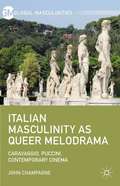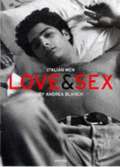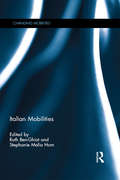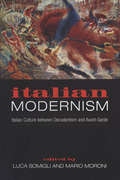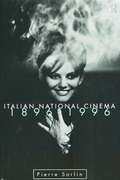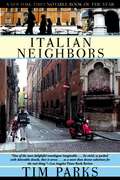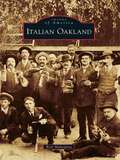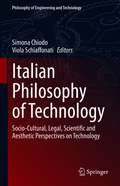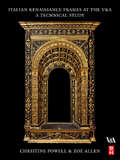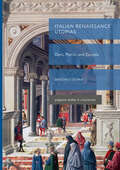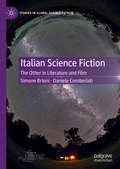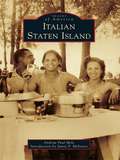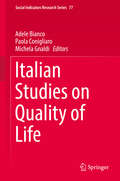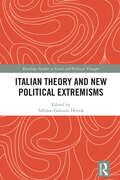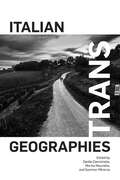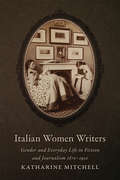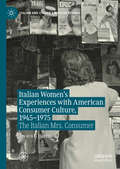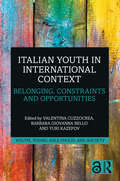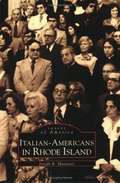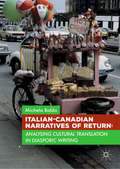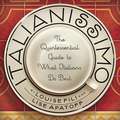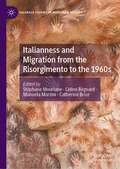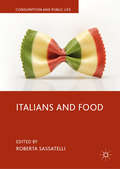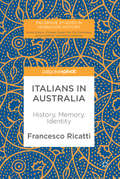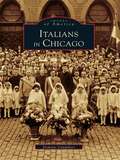- Table View
- List View
Italian Masculinity as Queer Melodrama
by John ChampagneOffering queer analyses of paintings by Caravaggio and Puccini and films by #65533;zpetek, Amelio, and Grimaldi, Champagne argues that Italian masculinity has often been articulated through melodrama. Wide in scope and multidisciplinary in approach, this much-needed study shows the vital role of affect for both Italian history and masculinity studies.
Italian Men: Love & Sex
by Andrea BlanchFrom Armani to Zefferelli, Italian men have long been synonymous with fashion, style, and sensuality. In this collection of fascinating personal reflections and photographs, Italian men-be they aristocrats, world-class designers, international businessmen, or men on the street-divulge their deeper thoughts on lust, love, and romance. These Icons harbor wildly divergent, yet always passionate views on matters of the heart: Luciano Pavoratti explores the power of love while Olympic gold medallist Alberto Tomba boasts of sexual conquests. Bernardo Bertolucci, Harry Cipriani, and Leonardo Mondadori-as well as Armani and Zefferelli-are among those striking poses in this high-style expos of Italian male magnetism.
Italian Mobilities (Changing Mobilities)
by Ruth Ben-Ghiat Stephanie Malia HomThe Italian nation-state has been defined by practices of mobility. Tourists have flowed in from the era of the Grand Tour to the present, and Italians flowed out in massive numbers in the late 19th and early 20th centuries: Italians made up the largest voluntary emigration in recorded world history. As a bridge from Africa to Europe, Italy has more recently been a destination of choice for immigrants whose tragic stories of shipwreck and confinement are often in the news. This first-of-its-kind edited volume offers a critical accounting of those histories and practices, shedding new light on modern Italy as a flashpoint for mobilities as they relate to nationalism, imperialism, globalization, and consumer, leisure, and labor practices. The book’s eight essays reveal how a country often appreciated for what seems immutable - its classical and Renaissance patrimony - has in fact been shaped by movement and transit.
Italian Modernism
by Mario Moroni Luca SomigliItalian Modernism was written in response to the need for an historiographic and theoretical reconsideration of the concepts of Decadentismo and the avant-garde within the Italian critical tradition. Focussing on the confrontation between these concepts and the broader notion of international modernism, the essays in this important collection seek to understand this complex phase of literary and artistic practices as a response to the epistemes of philosophical and scientific modernity at the end of the nineteenth century and in the first three decades of the twentieth.Intellectually provocative, this collection is the first attempt in the field of Italian Studies at a comprehensive account of Italian literary modernism. Each contributor documents how previous critical categories, employed to account for the literary, artistic, and cultural experiences of the period, have provided only partial and inadequate descriptions, preventing a fuller understanding of the complexities and the interrelations among the cultural phenomena of the time.
Italian National Cinema (National Cinemas)
by Pierre SorlinFrom such films as La Dolce Vita and Bicycle Thieves to Cinema Paradiso and Dear Diary, Italian cinema has provided striking images of Italy as a nation and a people. In the first comprehensive study of Italian cinema from 1886-1996, Pierre Sorlin explores the changing relationship of Italian cinema and Italian society and asks whether the national cinema really does represent Italian interests and culture.
Italian Neighbors
by Tim ParksIn this deliciously seductive account of an Italian neighborhood with a statue of the Virgin at one end of the street, a derelict bottle factory at the other, and a wealth of exotic flora and fauna in between, acclaimed novelist Tim Parks celebrates ten years of living with his wife, Rita, in Verona, Italy. Via Colombre, the main street in a village just outside Verona, offers an exemplary hodgepodge of all that is new and old in the bel paese, a point of collision between invading suburbia and diehard peasant tradition in a sometimes madcap, sometimes romantic always mixed-up world of creeping vines, stuccoed walls, shotguns, security cameras, hypochondria, and expensive sports cars. <p><p> Tim Parks is anything but a gentleman in Verona. With an Italian-born wife, an Italian made family, and a whole Italian condominium bubbling around him, he collects a gallery full of splendid characters who initiate us into all the foibles and delights of life in provincial Italy. <p> More than a travel book, Italian Neighbors is a sparkling, witty, beautifully observed tale of how the most curious people and places gradually assume the familiarity of home. Italian Neighbors is a rare work that manages to be both a portrait and an invitation for everyone who has ever dreamed about Italy.
Italian Oakland (Images of America)
by Rick MalaspinaOakland, the other city by the bay, was a magnet for Italian immigrants in the early decades of the 20th century. Some relocated from San Francisco after the devastating 1906 earthquake and fire; many more came to Oakland predominantly from Italy's northern regions of Piedmont, Liguria, and Lombardy in search of opportunity and prosperity. These pioneers worked hard, typically at backbreaking labor, to build new lives. They raised a generation of children who succeeded in their own right and contributed in various ways to their community and nation. As they established new roots and adopted new ways, congregating largely in north Oakland's vibrant and bustling Temescal neighborhood, these Italian Americans also nurtured their Old Country customs and traditions--many of which, along with rare glimpses of bygone days, are portrayed in this charming trip through time.
Italian Philosophy of Technology: Socio-Cultural, Legal, Scientific and Aesthetic Perspectives on Technology (Philosophy of Engineering and Technology #35)
by Viola Schiaffonati Simona ChiodoThis is the first volume about the Italian philosophy of technology written in English and including novel and translated contributions. The volume presents original research on emerging topics in the field, as well as an overview of the most distinguished Italian approaches to the philosophy of technology. While offering both historical and political perspectives and the contributions of the philosophy of law, philosophy of science, and aesthetics, Italian Philosophy of Technology promotes a novel view on the intersection between continental and analytic traditions in the philosophy of technology.
Italian Renaissance Frames at the V&A
by Christine Powell Zoe AllenThis visually stunning and technically detailed book is an in-depth analysis of the materials and techniques used on thirty eight of the V&A's Renaissance frames. The book will teach the reader to recognise frame style, structure and surface decoration of the period, as well as additions and alterations and later frames in the style. * First detailed technical analysis of the V&A's most important Renaissance frames * Highly illustrated with 100 + colour photos of front back and details, digital reconstructions, section profiles, and illustrations of frame types, joints and mouldings. * Provides a comparative reference for Renaissance frames in other publications Christine Powell has worked at the V&A since 1993. She is a Senior Furniture Conservator specialising in gilt wood European Furniture, mirror and picture frames. She has also worked at The National Gallery London for seven years as conservator working on European painted and gilt wood altarpieces and frames and The Wallace Collection for two years on European gilt wood frames and furniture. She has taught and published articles on the history, materials techniques and conservation of gilding. Christine studied furniture making and restoration of furniture at the London College of Furniture (latterly the Metropolitan University) including wood finishing, carving and gilding. Before this she worked in private practice for furniture restoration and special paint effects firms. She also attended Epsom School of Art and Design. Zoë Allen first joined the V&A in 2000 to work on gilt wooden objects for the British Galleries and returned to the V&A in 2003 where she has worked since as Frames and Gilded Furniture Conservator. Before joining the V&A full time she worked as a conservator for both public institutions, such as English Heritage, and private practices including projects at the Royal Academy, St Paul’s Cathedral and Somerset House. Zoë has published articles on her work. After a first degree in French Literature, Zoë studied conservation at the City & Guilds of London Art School. Her training covered the conservation of objects made from wood, stone and other sculptural materials, gilding and decorative surfaces. Internships included the National Institute for Restoration, Croatia, the Royal Collection, London and the Museum of London.
Italian Renaissance Utopias: Doni, Patrizi, and Zuccolo (Palgrave Studies in Utopianism)
by Antonio DonatoThis book provides the first English study (comprehensive of introductory essays, translations, and notes) of five prominent Italian Renaissance utopias: Doni’s Wise and Crazy World, Patrizi’s The Happy City, and Zuccolo’s The Republic of Utopia, The Republic of Evandria, and The Happy City. The scholarship on Italian Renaissance utopias is still relatively underdeveloped; there is no English translation of these texts (apart from Campanella’s City of Sun), and our understanding of the distinctive features of this utopian tradition is rather limited. This book therefore fills an important gap in the existing critical literature, providing easier access to these utopian texts, and showing how the study of the utopias of Doni, Patrizi, and Zuccolo can shed crucial light on the scholarly debate about the essential traits of Renaissance utopias.
Italian Science Fiction: The Other in Literature and Film (Studies in Global Science Fiction)
by Simone Brioni Daniele ComberiatiThis book explores Italian science fiction from 1861, the year of Italy’s unification, to the present day, focusing on how this genre helped shape notions of Otherness and Normalness. In particular, Italian Science Fiction draws upon critical race studies, postcolonial theory, and feminist studies to explore how migration, colonialism, multiculturalism, and racism have been represented in genre film and literature. Topics include the role of science fiction in constructing a national identity; the representation and self-representation of “alien” immigrants in Italy; the creation of internal “Others,” such as southerners and Roma; the intersections of gender and race discrimination; and Italian science fiction’s transnational dialogue with foreign science fiction. This book reveals that though it is arguably a minor genre in Italy, science fiction offers an innovative interpretive angle for rethinking Italian history and imagining future change in Italian society.
Italian Staten Island (Images of America)
by Andrew Paul Mele James P. MolinaroThe great wave of European immigration in the late 19th and early 20th centuries brought more than four million Italians to America. It was one of the greatest mass emigrations in world history, and many settled in Staten Island. Following the opening of the Verrazano-Narrows Bridge in 1964, the island experienced another great influx of Italian immigrants, this time from the other boroughs of New York City. This new wave was responsible for doubling the island population by the year 2000. Italian Americans are evident in every avocation and in each corner of Staten Island society, with achievers in education, business, government, medicine, and sports and entertainment. Italian Staten Island chronicles the traditions, culture, and heritage of Italian Americans through more than 200 photographs.
Italian Studies on Quality of Life (Social Indicators Research Series #77)
by Adele Bianco Paola Conigliaro Michela GnaldiThis volume provides an overview of the ways the Italian school of quality of life studies addresses well-being and quality of life, from both a substantive and a methodological point of view. It discusses various topics such as those of equitable and sustainable wellbeing, lifestyles, the organization of economy and welfare, as well as aspects related to the measurement of quality of life in small towns, institutional transparency and corruption prevention indicators. Chapters presented in this volume are drawn from papers presented at the conferences of the Italian Association for Quality of Life Studies (AIQUAV) held in Florence, Italy, in 2015 and 2016. The volume is organised into three parts. The first part is devoted to methods and indicators for research on quality of life, the second part to social sustainability, lifestyles, cultural aspects and local applications, and the third to economy, welfare and quality of life. The volume hosts contributions that are interdisciplinary in scope and mirror the complexity of the globalized world.
Italian Theory and New Political Extremisms (Routledge Studies in Social and Political Thought)
by Alfonso Galindo HervásSo far this century, the most developed democratic societies have witnessed the emergence of various extremist political movements. Some have nationalist connotations, others religious; there are right-wing and left-wing, pacifist and violent, with environmental or social motivations, etc. But they all share reactionary, dogmatic and illiberal traits. Such movements testify to some of the limitations of our societies and the condition of life in them. Therefore, understanding the challenges they pose to our institutions is vital not only to confront them but also to identify their shortcomings and work to improve them.Using Italian Theory as a conceptual lens, this book provides genealogies of current extremist political movements, their theoretical assumptions and the challenges they imply. Succinct and accessible chapters discuss different manifestations of political extremism: its violence, its relation to populism, its religious dimension, its conception of political action, some of its intellectual influences and its anti-liberal and totalitarian character, to name a few.Italian Theory and New Political Extremisms is highly relevant to researchers and students interested in learning a series of concepts, categories, metaphors and arguments that are unique and extraordinarily useful for approaching the phenomenon of political extremism in a comprehensive manner.
Italian Trans Geographies: Italian Trans Geographies (SUNY series in Italian/American Culture)
by Danila Cannamela; Marzia Mauriello; Summer MinervaHow does the mapping of Italian culture change when it is charted from the perspective of gender-variant people? Italian Trans Geographies tackles this question by retracing trans and gender-variant experiences within the Italian peninsula and along diasporic routes. The volume adopts a cross-disciplinary approach that combines scholarly analyses with grassroots engagement and creative work and centers the voices of Italian and Italian American transpeople through autobiographies, memoirs, interviews, poetry, and visual works. The contributions include works by key Italian trans activists, including Romina Cecconi, Porpora Marcasciano, and Helena Velena, as well as critical interpretations of scholars and artists (many of whom self-identify as trans). Ultimately, these voices show how trans people have contributed to shaping Italian places and cultures while, in turn, being shaped by those places and cultures. Through its attention to geospecific sites, the book highlights blind spots in the hegemonic Anglo-American discourse about gender and overlooked intersections between LGBTQIA+ global discourse and local realities.
Italian Women Writers: Gender and Everyday Life in Fiction and Journalism, 1870-1910 (Toronto Italian Studies)
by Katharine MitchellPost-Unification Italy saw an unprecedented rise of the middle classes, an expansion in the production of print culture, and increased access to education and professions for women, particularly in urban areas. Although there was still widespread illiteracy, especially among women in both rural and urban areas, there emerged a generation of women writers whose domestic fiction and journalism addressed a growing female readership. This study looks at the work of three of the most significant women writers of the period: La Marchesa Colombi, Neera, and Matilde Serao. These writers, whose works had been largely forgotten for much of the last century, only to be rediscovered by the Italian feminist movement of the 1970s, were widely read and received considerable critical acclaim in their day. In their realist fiction and journalism, these professional women writers documented and brought to light the ways in which women participated in everyday life in the newly independent Italy, and how their experiences differed profoundly from those of men.Katharine Mitchell shows how these three authors, while hardly radical emancipationists, offered late-nineteenth-century readers an implicit feminist intervention and a legitimate means of approaching and engaging with the burning social and political issues of the day regarding "the woman question" - women's access to education and the professions, legal rights, and suffrage. Through close examinations of these authors and a selection of their works - and with reference to their broader artistic, socio-historical, and geo-political contexts - Mitchell not only draws attention to their authentic representations of contemporary social and historical realities, but also considers their important role as a cultural medium and catalyst for social change.
Italian Women's Experiences with American Consumer Culture, 1945–1975: The Italian Mrs. Consumer (Italian and Italian American Studies)
by Jessica L. HarrisThis book analyzes the spread of American female consumer culture to Italy and its influence on Italian women in the postwar and Cold War periods, eras marked by the political, economic, social, and cultural battle between the United States and Soviet Union. Focusing on various aspects of this culture—beauty and hygiene products, refrigerators, and department stores, as well as shopping and magazine models—the book examines the reasons for and the methods of American female consumer culture’s arrival in Italy, the democratic, consumer capitalist messages its products sought to “sell” to Italian women, and how Italian women themselves reacted to this new cultural presence in their everyday lives. Did Italian women become the American Mrs. Consumer? As such, the book illustrates how the modern, consuming American woman became a significant figure not only in Italy’s postwar recovery and transformation, but also in the international and domestic cultural and social contests for the hearts and minds of Italian women.
Italian Youth in International Context: Belonging, Constraints and Opportunities (Youth, Young Adulthood and Society)
by Yuri Kazepov Valentina Cuzzocrea Barbara Giovanna BelloItaly is not a country for young people. Why? This book provides a unique and in-depth collection of empirical and theoretical material providing multiple answers to this question whilst investigating the living conditions of young people in Italy today. By bringing together a variety of approaches and methods, the authors of this collection analyze Italian youth through the lenses of three dimensions: ‘Activism, participation and citizenship’, ‘Work, Employment and Careers’ and ‘Moves, Transitions and Representations’. These dimensions are the analytical building blocks for challenging stereotypes and unveiling misinterpretations and taken-for-granted assumptions that portray young people in Italy as selfish, ‘choosy’, and unwilling to make sacrifices, commit and manage an independent life. These prejudices often underplay the role of constraints they are facing in the transition to adulthood. Studying Italian youth, therefore, not only allows us to capture their peculiar characteristics but also to reflect more broadly on the conceptual toolbox we need in order to understand contemporary youth more generally. By doing so, the volume aims to contribute to international discussion on the youth condition in Europe.
Italian-Americans In Rhode Island (Images Of America Series)
by Joseph R. MuratoreFrom humble immigrant beginnings, the Italian-American community in Rhode Island grew to become a significant factor in the state's development. <P><P>In government and in business, in religion and in civic affairs, Italian-Americans in Rhode Island contributed a great deal to the development of their communities. This marvelous new photographic history seeks to recognize those contributors and spotlight their achievements. Covering the period from 1884 to 1996, this volume showcases images from the author's personal archives, and the collections of local families, the Providence Public Library, and the Coalition of Italian Organizations. <P><P> Major Italian-American figures in the state's history are illustrated, and detailed captions offer family histories--including information about the family's hometown in Italy--and brief summaries of the individual's achievements. This accessible and colorful presentation will appeal to many who wish to remember the contributions of their ancestors.
Italian-Canadian Narratives of Return: Analysing Cultural Translation in Diasporic Writing
by Michela BaldoThis book examines the concept of translation as a return to origins and as restitution of lost narratives, and is based on the idea of diaspora as a term that depicts the longing to return home and the imaginary reconstructions and reconstitutions of home by migrants and translators. The author analyses a corpus made up of novels and a memoir by Italian-Canadian writers Mary Melfi, Nino Ricci and Frank Paci, examining the theme of return both within the writing itself and also in the discourse surrounding the translations of these works into Italian. These ‘reconstructions’ are analysed through the lens of translation, and more specifically through the notion of written code-switching, understood here as a fictional tool which symbolizes the translational movements between different points of view. This book will be of particular interest to students and scholars of translation and interpreting, migration studies, and Italian and diasporic writing.
Italianissimo: The Quintessential Guide to what Italians Do Best
by Louise Fili Lise ApatoffWhat is it about Italy that inspires passion, fascination, and utter devotion? This quirky guide to the Italian way of life, with its fifty witty mini-essays on iconic Italian subjects, will answer that question as well as entertain and delight both real and armchair travelers. Topics range from expressive hand gestures to patron saints, pasta, parmesan, shoes, opera, the Vespa, the Fiat 500, gelato, gondolas, and more. History, folklore, superstitions, traditions, and customs are tossed in a delicious sauce that also includes a wealth of factual information for the sophisticated traveler:• why lines, as we know them, are nonexistent in Italy• why a string of coral beads is often seen around a baby’s wrist• what the unlucky number of Italy is (it’s not thirteen, unless seating guests at a table, when it IS thirteen–taking into account the outcome of the Last Supper)• why red underwear begins to appear in shops as the New Year approaches In addition to the lyrical and poetic, Italianissimo provides useful and indispensable information for the traveler: deciphering the quirks of the language (while English has only one word for “you,” in Italy there are three), the best place to find balsamic vinegar (in Modena, of course), the best gelato (in Sicily, where they first invented it using the snow from Mount Etna). There are also recommendations for little-known museums and destinations (the Bodoni museum, the Pinocchio park, legendary coffee bars).This is a new kind of guidebook overflowing with enlightening and hilarious miscellaneous information, filled with luscious graphics and unforgettable photographs that will decode and enrich all trips to Italy–both real and imaginary
Italianness and Migration from the Risorgimento to the 1960s (Palgrave Studies in Migration History)
by Manuela Martini Stéphane Mourlane Céline Regnard Catherine BriceThis edited collection explores the notion of Italianness - or Italianità – through migration history. It focuses on the interaction between Italians circulating around the world, and their relationship with Italy from a political and cultural perspective. Answering the important question of how migration affects Italianness, the authors explore the ways in which migrants retained their Italian culture, customs and practices during and after their travels. Spanning a long period from the Risorgimento up until the 1960s, the book sheds light on the institutions and social structures that contributed to the construction of cultural links between Italian migrants and their country of origin. Not only broad in its temporal scope, the volume covers a wide geographic area, examining the lives of Italian migrants in North America, South America, Europe, North Africa, and the Middle East. Bringing together a wealth of research on Italians, alongside the different migratory routes taken by these men and women, this book provides new insights into Italian culture and seeks to strengthen our understanding of Italian migration history.
Italians and Food (Consumption and Public Life)
by Roberta SassatelliThis book is a novel and original collection of essays on Italians and food. Food culture is central both to the way Italians perceive their national identity and to the consolidation of Italianicity in global context. More broadly, being so heavily symbolically charged, Italian foodways are an excellent vantage point from which to explore consumption and identity in the context of the commodity chain, and the global/local dialectic. The contributions from distinguished experts cover a range of topics including food and consumer practices in Italy, cultural intermediators and foodstuff narratives, traditions of production and regional variation in Italian foodways, and representation of Italianicity through food in old and new media. Although rooted in sociology, Italians and Food draws on literature from history, anthropology, semiotics and media studies, and will be of great interest to students and scholars of food studies, consumer culture, cultural sociology, and contemporary Italian studies.
Italians in Australia: Italians In Postwar Australia (Palgrave Studies in Migration History)
by Francesco RicattiThis book provides a concise and innovative history of Italian migration to Australia over the past 150 years. It focuses on crucial aspects of the migratory experience, including work and socio-economic mobility, disorientation and reorientation, gender and sexual identities, racism, sexism, family life, aged care, language, religion, politics, and ethnic media. The history of Italians in Australia is re-framed through key theoretical concepts, including transculturation, transnationalism, decoloniality, and intersectionality. This book challenges common assumptions about the Italian-Australian community, including the idea that migrants are ‘stuck’ in the past, and the tendency to assess migrants’ worth according to their socio-economic success and their alleged contribution to the Nation. It focuses instead on the complex, intense, inventive, dynamic, and resilient strategies developed by migrants within complex transcultural and transnational contexts. In doing so, this book provides a new way of rethinking and remembering the history of Italians in Australia.
Italians in Chicago: 1945-2005 (Images of America)
by Dominic CandeloroThe stories of Chicago's Italian communities are an important part of the rich and diverse mosaic of Chicago history. As a rail center, an industrial center, and America's fastest growing major city, Chicago offered opportunities for immigrants from all nations. Italians in Chicago presents an intriguing narrative record of the earliest beginnings of Italian communities in the city, going back to the 1850s. It explores the lives of ten significant members of the Chicago Italian-American community.This book is a collaborative, cumulative effort, and gives glimpses and echoes of what occurred in the Italian-American past in Chicago. Including vintage images and tales of such individuals as Father Armando Pierini, Anthony Scariano, and Joe Bruno, and groups such as the Aragona Club and the Maria Santissima Lauretana Society, this collection uncovers the challenges and triumphs of these Italian immigrants.
